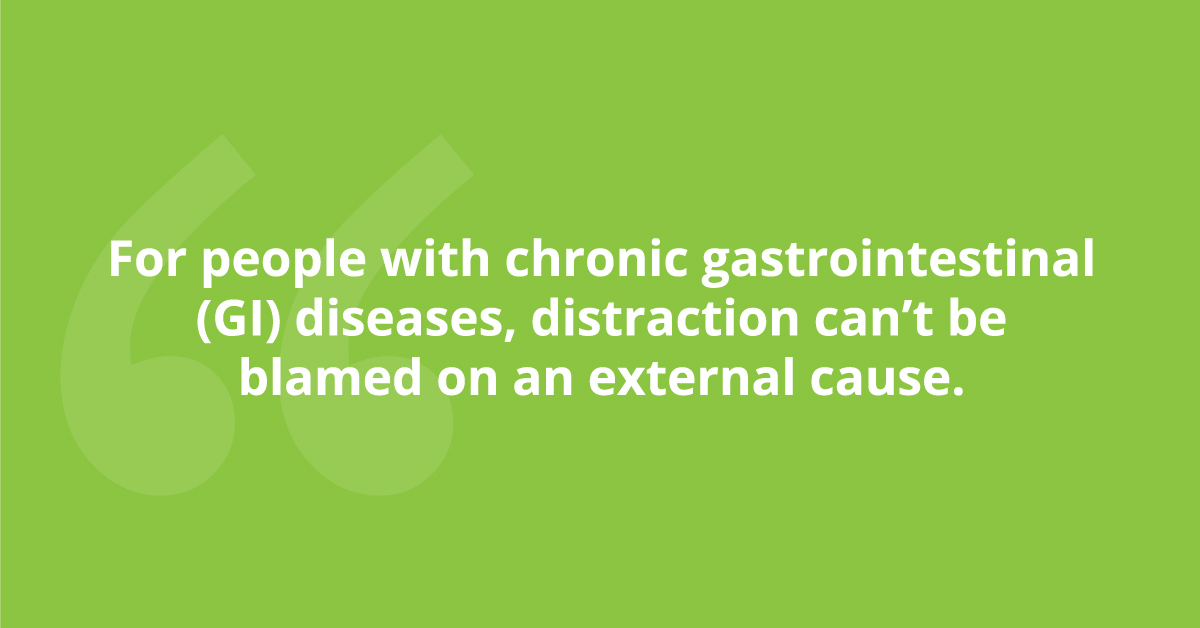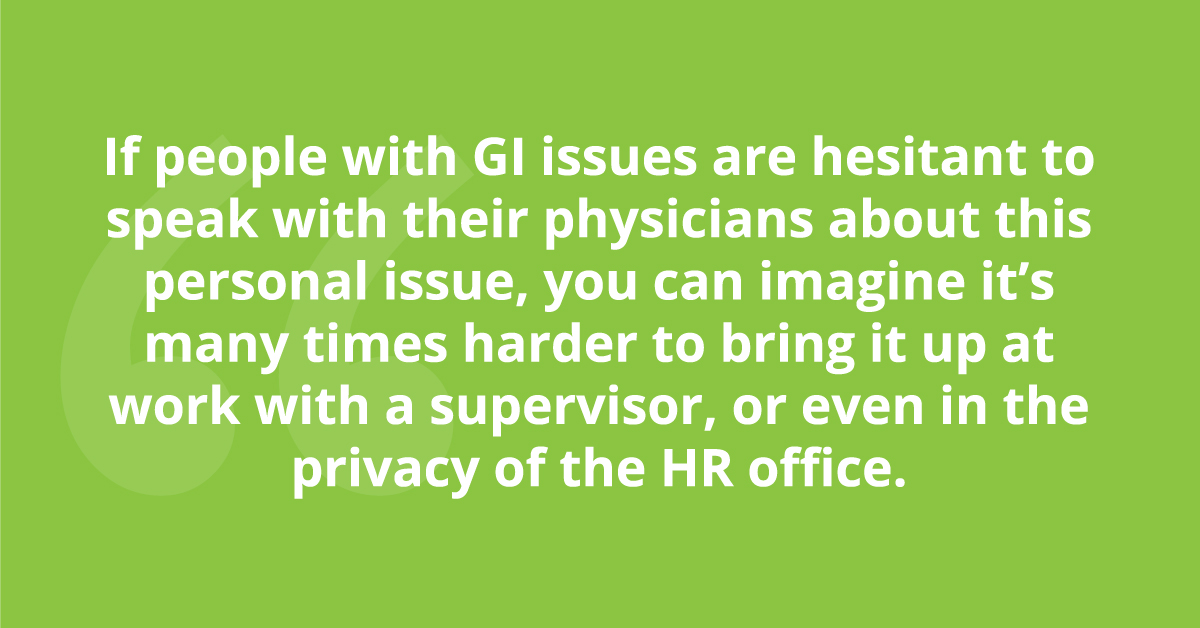We all know how hard it can be to focus on a task when something’s distracting you. Distractions come from a number of places. For some, loud noises and chatty coworkers draw attention away from productivity. Or it could be too many meetings and messaging “pings” popping up throughout the day. And then there are the more subtle, environmental factors—like when the office temperature is too hot or cold.
For people with chronic gastrointestinal (GI) diseases, distraction can’t be blamed on an external cause. Instead, the issue that makes focused work incredibly difficult comes from inside. And that’s why employers cannot overlook the role digestive health plays in helping employees be productive, healthy and happy.
You may be wondering: how prevalent are digestive diseases in the first place… and how do you know if they’re cutting into employee productivity? Let’s take a look.
Gut issues: more common than you’d think
First, the blanket term “GI issues” includes a number of different diseases and disorders affecting the GI tract. Dozens of conditions fall under the GI umbrella, but some of the more common ones include gastroesophageal reflux disease (GERD), irritable bowel syndrome (IBS), Crohn’s disease, colitis, Celiac disease, and diverticulitis.

Symptoms of these disorders also vary depending on the condition and its severity, but those who suffer from GI problems deal with issues like heartburn/acid reflux, nausea, diarrhea, constipation, and cramps. Each of these symptoms can be debilitating on their own, but some GI disease sufferers deal with several of these at the same time.
Right now, about 74 percent of Americans are living with ongoing digestive health conditions. What’s more, over half of them have not talked to their doctors about their symptoms. Those that do must then begin an often-lengthy process to receive a definitive diagnosis. Challenges can include finding local GI specialists, going through a battery of diagnostic tests and procedures, and then working through possible treatment plans. Essentially, these factors make GI disease one of the most prevalent least-talked-about health challenges around.
It’s pretty easy to understand why people don’t talk to their doctors about GI problems: issues surrounding digestion tend to be the butt of jokes (pardon the pun). In all sincerity, Americans are just not comfortable talking about “bathroom issues” without cloaking it in humor. That’s because it’s tough to talk about having to visit the restroom multiple times a day or explain you’re feeling uncomfortable due to cramps or gas pains.
So, if people with GI issues are hesitant to speak with their physicians about this personal issue, you can imagine it’s many times harder to bring it up at work with a supervisor, or even in the privacy of the HR office.
Hard to focus when your gut hurts
In some instances, talking about the issue is unavoidable. At some point, management is likely to talk with an employee who racks up a high number of absences or displays “presenteeism”—where they’re at work, but not functioning at their best due to illness and/or distraction. Initially, these can be uncomfortable conversations for both parties, but opening up communication can be a highway toward better working relationships and trust.

After all, if Bob needs to take more frequent breaks and is not always at his workstation when coworkers expect him to be there, it can cause tension and even resentment among staff. But if Bob’s manager learns Bob suffers from inflammatory bowel disease (IBD) and alternates between painful constipation and diarrhea on a regular basis, they could work together to create a break schedule that accommodates extra trips to the bathroom.
And if Cathy regularly skips group lunches or potluck day, it’s not that she’s antisocial or a poor team player. It really could be that she’s desperately trying to avoid a celiac-related flare-up if she inadvertently eats gluten. If her supervisor knows about it, the company could begin normalizing the inclusion of gluten-free food options at work events.
Even if an employee has learned to manage symptoms while at work, another reality is GI patients may require more frequent doctor appointments. Some studies have concluded such employees may benefit from flexible scheduling and/or work-from-home options. Don’t be afraid to consider these and other accommodations, when possible, to help ensure a more positive work/life balance.
Overall, talking it over with honesty and clear communication is the first step toward making a hard-to-talk-about issue a lot easier to swallow…both figuratively and literally.
Aggravating factors at work can make GI issues worse
Work can be a very stressful place at times. While some stress can be avoided with proper task delegation, communication and resource allocation, a certain level of stress is just, well, part of the job. We all get busy and can work long hours from time to time. Unfortunately, stress can make symptoms of GI disease much worse. (Dig into 5 Strategies to Take Control of Stress )
It’s going to be doubly hard for someone with, say, IBS, to be as productive as possible when stress is mounting during work hours. IBS can be particularly sensitive to stress, according to the International Foundation for Functional Gastrointestinal Disorders (IFFGD). An IFFGD white paper states: “The pain in IBS is closely related to an altered response by the brain to normal signals that arise from the gut, which ‘turn up the volume’ on sensations.”
Beyond circumstances directly related to specific digestive conditions, a microscopic link between the mind and the gut is also being studied. Some research has focused on identifying a possible correlation between the gut microbiome and mental health. Bacterial compounds in the gut may be linked to depression and decreased quality of life, according to researchers at KU Leuven-University of Leuven and the VIB Center for Microbiology in Belgium.
Digital health solutions can produce positive results
Overall, offering employees a program that doesn’t cost them anything extra and helps them to manage the painful, disruptive symptoms of GI disease can bring a multitude of benefits. GIThrive® can provide private, digital support ranging from quick resources for food-as-medicine to personalized lifestyle recommendations. This can be a real morale-boost to your employees to know they’ve got a free resource to help them feel better–and prevent lost productivity.
There’s more to GIThrive, so if you’re curious to know how it works and what kind of costs you might be saving with a program like this, we’re here to help you figure that out.







